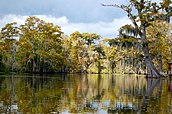Portal:Wetlands/Selected article/17

A bayou is a Franco-English term used in the United States for a body of water typically found in a flat, low-lying area, and can refer either to an extremely slow-moving stream or river (often with a poorly defined shoreline), or to a marshy lake or wetland. The name "bayou" can also refer to a creek whose current reverses daily due to tides and which contains brackish water highly conducive to fish life and plankton. Bayous are commonly found in the Gulf Coast region of the southern United States, notably the Mississippi River Delta, with the states of Louisiana and Texas being famous for them. A bayou is frequently an anabranch or minor braid of a braided channel that is moving much more slowly than the mainstem, often becoming boggy and stagnant. Though fauna varies by region, many bayous are home to crawfish, certain species of shrimp, other shellfish, catfish, frogs, toads, American alligators, American crocodiles, herons, turtles, spoonbills, snakes, leeches and myriad other species.
Bayou Country is most closely associated with Cajun and Creole cultural groups native to the Gulf Coast region generally stretching from Houston, Texas, to Mobile, Alabama, and picking back up in South Florida around the Everglades with its center in New Orleans. (Full article...)
